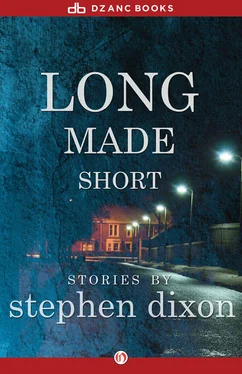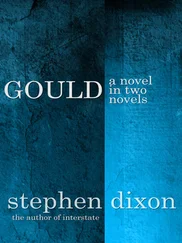Stephen Dixon - Long Made Short
Здесь есть возможность читать онлайн «Stephen Dixon - Long Made Short» весь текст электронной книги совершенно бесплатно (целиком полную версию без сокращений). В некоторых случаях можно слушать аудио, скачать через торрент в формате fb2 и присутствует краткое содержание. Год выпуска: 2013, Издательство: Dzanc Books, Жанр: Современная проза, на английском языке. Описание произведения, (предисловие) а так же отзывы посетителей доступны на портале библиотеки ЛибКат.
- Название:Long Made Short
- Автор:
- Издательство:Dzanc Books
- Жанр:
- Год:2013
- ISBN:нет данных
- Рейтинг книги:3 / 5. Голосов: 1
-
Избранное:Добавить в избранное
- Отзывы:
-
Ваша оценка:
- 60
- 1
- 2
- 3
- 4
- 5
Long Made Short: краткое содержание, описание и аннотация
Предлагаем к чтению аннотацию, описание, краткое содержание или предисловие (зависит от того, что написал сам автор книги «Long Made Short»). Если вы не нашли необходимую информацию о книге — напишите в комментариях, мы постараемся отыскать её.
Long Made Short — читать онлайн бесплатно полную книгу (весь текст) целиком
Ниже представлен текст книги, разбитый по страницам. Система сохранения места последней прочитанной страницы, позволяет с удобством читать онлайн бесплатно книгу «Long Made Short», без необходимости каждый раз заново искать на чём Вы остановились. Поставьте закладку, и сможете в любой момент перейти на страницу, на которой закончили чтение.
Интервал:
Закладка:
I didn’t say what I really wanted to there, only because for whatever it is — my inability to say things clearly and straight and because I really don’t have the means to — the language, words, I’m simply unable to do it well, on paper and orally most of the time also, besides not probably having the necessary kind of intelligence and insights. I don’t even know if what I just said makes much sense, but let me get on with this. I was where before? Where was I? I’m trying to convey another person and, without being explicit, a person’s feelings about her death and the way it changes ordinary life when it suddenly comes and what it can bring out in himself. That and more. Anyway, first place she takes me to that first day — Monday — is Red Square. “Krasnaya —‘red’—I’d also like to teach you Russian words connected to the places we go to, which is the easiest way to learn them — through practical identification. Like ulitsa —‘street’—which you’ll see everywhere after a word like Herzen or Gorki on buildings and street-post signs, but first I must also teach you the Russian alphabet. And we might as well get Krasnaya Ploschad out of the way — see what I mean now? You understood without questioning me. But you can’t be allowed to return home without saying you’ve been there, can you?”
“I think I can. But okay. Even though Marguerite and I went there the Saturday we got here — she insisted I see it at night — I never saw it in the day and nothing was open.”
“Shall we walk? It’s only two kilometers or and a half, and I can walk that far. It’s supposed to be healthy for me besides.” I ask how the sidewalks are—“It looks cold and wet out”—and she says icy and I suggest we take the metro or a cab. I didn’t want her falling or holding on to me for so long a walk. “If you have dollars to pay or packs of American cigarettes to show and give away we can get a cab, something most Muscovites can’t do here. I doubt you’ll want to see inside the Kremlin buildings. They’re rather vulgar — glittery jewels and gold and thrones — though you might want to see the domes over the Kremlin. But Saint Basil’s in Krasnaya Ploschad has some of the best of those and later today or tomorrow we’ll go to Novodevichy— novo , which is one of the forms of ‘new’—which I think has the city’s most beautiful of them. And I’d like taking you by train to Novgorod, which to me has the world’s most beautiful of all.”
She goes on like that. Steers me where she wants to go, doesn’t think much of my suggestions. Arabat Street, where I’d like to get my gift buying done with: matryoska or maritroska dolls — I can never seem to get the word right — and painted wooden boxes and barrettes and decorated potholders and things like that. “Exclusively for tourists,” she says, “who want their pockets combed through and gypsy beggar boys to steal their wallets and socks and shoes. Oh, they’ll do it, and with baby brothers on their backs to distract you. But if you insist to go there, I won’t stop you, but it’s walk walk walk through unruly crowds for practically one of your miles.” Chekhov Museum—“Ugly, not at all brings to vivid life the personality and living style of the man. But you love him, is that why? He’s not Tolstoi, but I like his work very much too. ‘Toska’ —that’s ‘misery’ or ‘grief or really ‘long drawn-out sorrow’-not translatable as one word, and you can always remember it by the opera of the same name. A touching story. Very few as good except ‘Ivan Ilyich,’ which is more than touching — it’s terrifying. This man reconciling himself to death after such an empty, trivial — how should I say it? — unenlightened life? I read it once a year. Just as your War and Peace there I try to every three years or anytime I need some tranquillity of spirit and mind. You were right to bring only that book with you — it serves the place of an entire library. Unfortunately there is little left of the Russian soul that’s in that novel.” The most grandiose metro stations—“For tour buses to empty themselves out into only, except for regular riders like myself who truly use it. You’ll be staring up at the statuary and chandeliers while getting bumped by our rudest inhabitants, too ignorant or impolite or perhaps too eager in a rush to excuse themselves, even to foreigners. But you wish to see these stations — and the deepest you say, for some unexplained reasons? — then we’ll go to these too.”
After we all have dinner at the hotel restaurant and Svetlana leaves I say to Marguerite “Did you see the way she made those last-minute sandwiches? I mean, she got a free meal — I’m not begrudging her it, since it was cheap enough and she wasn’t too intrusive at the table and I had enough wine in me to ward her off when she was. And I know there’s a shortage of dairy stuff in Moscow. But Jesus, have some self-respect and maybe consideration for us, since this is our hotel, and don’t stuff the rest of the table bread into your bag and fill the two slices of bread left on your plate with a quarter pound of butter and wrap that up for home too. I shouldn’t be saying all this, right? since I probably don’t know what I’m talking about.”
“It’s that you forget. She asked our permission first. She’s giving the butter to an old woman in her building who can’t get any and the bread I guess she figures the woman will like also or else just that the kitchen will throw it away. But suppose she was drying the bread for herself and hoarding the butter for a day when she won’t have any, like tomorrow perhaps? So what.”
“Okay, fair. But also, when she talks to us I kind of get upset”—“You get very upset”—“I get a little less than that upset that she keeps me out entirely, and it’s in English. When I do say something when you’re around she often looks at me as if I were a kid who’s barged in when he’s been warned not to, as if this is adult conversation only so buzz off. You’re the big genius and intellectual toiler she’s saying — after all, it’s your project we’ve come here for. I’m just a stupid site-gazer — didn’t know Red Square wasn’t inside the Kremlin — but at least I was honest enough to admit it. Doesn’t know the difference between the Tver — that the way to say it? — and Novgorod Russian icon schools. Why should I know? Who does but an art expert of that period or field or someone who has few books to choose from in libraries and stores but all the time in the world to read? But credit me with a little intelligence and conversational interest or skills or whatever you want to call it. Someone who can on occasion talk with some knowledge and depth about the less poppy and mundane things. For instance, also credit me with — but nothing, when at the Pushkin, seeing me standing there staring at the Van Goghs for a few minutes, she asks me do I like them. ‘You bet,’ I said, which is what I usually say in front of Van Goghs, for what am I going to do when I’m still in a state of enthrallment, go into every crack, dab, dot and corner? But she gives me the French expression about each to his own taste or gut and then starts in with this pro-Monet and-Cézanne and anti-Vincent treatiselike argument or lecture I could hardly understand it was so over my head, or else she didn’t know how to deliver it clearly and succinctly in English. But how these three Van Goghs all on the same wall are critically puffed up by unscrupulous experts, dealers and museums so people — like me, I’m sure she’s saying — who know little to zero about art and artistry will pay fifty million bucks apiece for. My point is she thinks I’m uncultured, or barely cultured — certainly not intelligent. A walking talking absurdity when you think this shmuck also teaches at a university. Even if it were phys ed or home ec I taught — still, he represents the academy so should be much smarter, know several languages backwards, be able to communicate without hesitation and with full intellectual rigor and appropriate ornate words what he knows, sees and likes instead of being someone who probably always needs a thesaurus when he writes and talks. The typical example of the stereotyped American tourist she’s shown around Moscow or just interpreted for before. Except of course you — ah, the intelligentsia. And those rare nonacademic people like the ones in Boston who gave you her name — fancy journalists, magazines — but so cultivated she kept telling me: educated, eloquent, polyglottal — at least the guy — worldly and well read and with even an executed Decembrist count way back in his family. Because I’ve no advanced degrees or easy time with the spoken language and have little political feeling or at least nothing much to say about it for either of our countries, she thinks I’ve no mind of my own and so have to have everything explained.”
Читать дальшеИнтервал:
Закладка:
Похожие книги на «Long Made Short»
Представляем Вашему вниманию похожие книги на «Long Made Short» списком для выбора. Мы отобрали схожую по названию и смыслу литературу в надежде предоставить читателям больше вариантов отыскать новые, интересные, ещё непрочитанные произведения.
Обсуждение, отзывы о книге «Long Made Short» и просто собственные мнения читателей. Оставьте ваши комментарии, напишите, что Вы думаете о произведении, его смысле или главных героях. Укажите что конкретно понравилось, а что нет, и почему Вы так считаете.












